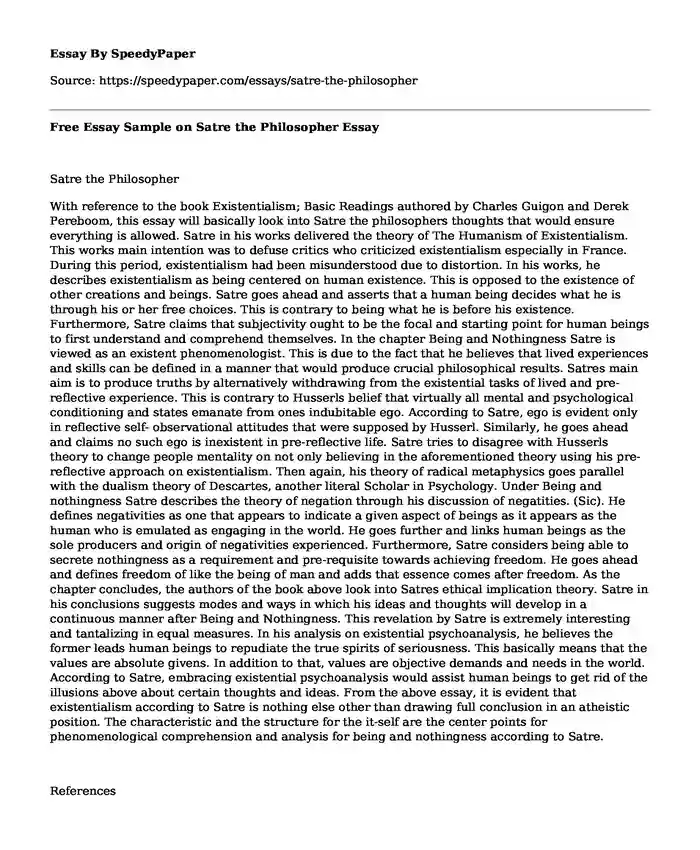
| Type of paper: | Essay |
| Categories: | Philosophy Personality Philosophers |
| Pages: | 3 |
| Wordcount: | 571 words |
Satre the Philosopher
With reference to the book Existentialism; Basic Readings authored by Charles Guigon and Derek Pereboom, this essay will basically look into Satre the philosophers thoughts that would ensure everything is allowed. Satre in his works delivered the theory of The Humanism of Existentialism. This works main intention was to defuse critics who criticized existentialism especially in France. During this period, existentialism had been misunderstood due to distortion. In his works, he describes existentialism as being centered on human existence. This is opposed to the existence of other creations and beings. Satre goes ahead and asserts that a human being decides what he is through his or her free choices. This is contrary to being what he is before his existence. Furthermore, Satre claims that subjectivity ought to be the focal and starting point for human beings to first understand and comprehend themselves. In the chapter Being and Nothingness Satre is viewed as an existent phenomenologist. This is due to the fact that he believes that lived experiences and skills can be defined in a manner that would produce crucial philosophical results. Satres main aim is to produce truths by alternatively withdrawing from the existential tasks of lived and pre-reflective experience. This is contrary to Husserls belief that virtually all mental and psychological conditioning and states emanate from ones indubitable ego. According to Satre, ego is evident only in reflective self- observational attitudes that were supposed by Husserl. Similarly, he goes ahead and claims no such ego is inexistent in pre-reflective life. Satre tries to disagree with Husserls theory to change people mentality on not only believing in the aforementioned theory using his pre-reflective approach on existentialism. Then again, his theory of radical metaphysics goes parallel with the dualism theory of Descartes, another literal Scholar in Psychology. Under Being and nothingness Satre describes the theory of negation through his discussion of negatities. (Sic). He defines negativities as one that appears to indicate a given aspect of beings as it appears as the human who is emulated as engaging in the world. He goes further and links human beings as the sole producers and origin of negativities experienced. Furthermore, Satre considers being able to secrete nothingness as a requirement and pre-requisite towards achieving freedom. He goes ahead and defines freedom of like the being of man and adds that essence comes after freedom. As the chapter concludes, the authors of the book above look into Satres ethical implication theory. Satre in his conclusions suggests modes and ways in which his ideas and thoughts will develop in a continuous manner after Being and Nothingness. This revelation by Satre is extremely interesting and tantalizing in equal measures. In his analysis on existential psychoanalysis, he believes the former leads human beings to repudiate the true spirits of seriousness. This basically means that the values are absolute givens. In addition to that, values are objective demands and needs in the world. According to Satre, embracing existential psychoanalysis would assist human beings to get rid of the illusions above about certain thoughts and ideas. From the above essay, it is evident that existentialism according to Satre is nothing else other than drawing full conclusion in an atheistic position. The characteristic and the structure for the it-self are the center points for phenomenological comprehension and analysis for being and nothingness according to Satre.
References
Guignon, C. & Pereboom, D. (2001). Existentialism. Indianapolis: Hackett.
Cite this page
Free Essay Sample on Satre the Philosopher. (2017, Sep 11). Retrieved from https://speedypaper.com/essays/satre-the-philosopher
Request Removal
If you are the original author of this essay and no longer wish to have it published on the SpeedyPaper website, please click below to request its removal:
- The Challenge of Crime in a Free Society
- Sociology - A Free Essay with a Case Study on Obesity
- Free Essay: Reason for Walmart Success and Their Essential Competitive Advantage
- Free Essay on Advantages of Harmonizing Accounting Standards and Recent Success
- Essay Sample on Gun Violence
- Essay Example on The Fall of the House of Usher by Edgar Allan Poe
- Financial Research Report of Home Depot Inc. Paper Example
Popular categories




